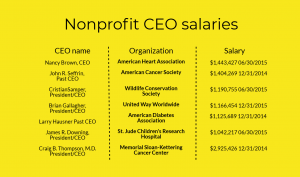When a disaster strikes, most people look for ways to do good in the community, including donating time, money, or food for people in need.
Although the sentiment is great, donating your money to a large non-local disaster aid organization might not be the best thing to do.
Here’s why:
Most non-profit organizations take a percentage of the money raised, typically between seven to 20 percent. This is reasonable considering people make a living off of being employed by the organization. However, some CEOs and other administrators of the organizations listed below make more than a million dollars a year, excluding benefits.
In my opinion, you should not be making that much if you want to market your organization as a non-profit organization. Here’s a few commonly known organizations and their salaries.

Despite these organizations listed, there are some charities that do have more reasonable salaries for their CEOs, Take UNICEF for example. When faced with rumors of their efficiency, UNICEF defended their CEO’s salary on their website saying, “As President and CEO of the U.S. Fund for UNICEF, Caryl Stern earns $521,820. She does not have a company car; she drives a 2007 Prius which she purchased in 2009.”
Forbes Magazine also rated this organization’s efficiency at 91 percent, meaning that for every dollar donated, 91 cents goes to charity work.
Another organization is The Red Cross, which recently set up shelters at the Ventura County fairgrounds for victims of the Thomas Fire. This is also a charity with a reasonable CEO salary.
According to The Red Cross’ website, “The president and CEO of the American Red Cross is Gail McGovern, and her base salary has remained $500,000—without any pay increase—since she joined the American Red Cross in 2008. This is considered well within the range for executives of large non-profits like the Red Cross, a $3.3 billion organization.”
So with all of these facts in mind, my opinion is that it’s always so much better to donate to local charities such as churches or school sites, because the items will stay within that area and help people locally.
By doing this, we’re not scammed into trusting some claim made on television. One may also know the person they’re entrusting with their donations, such as a local pastor or high school principal, versus someone they’ve never met that’s in charge of an organization.
So yes of course, donate money, clothes, food, etc to people in need, but think twice about how you do it, so that your donations don’t go to waste.














